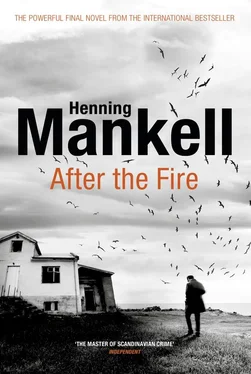‘We’re not allowed to learn to die,’ Jansson said.
‘What do you mean?’
‘In the past death was a part of life. Now it’s completely separate. I remember I was six years old when my grandmother died. Her body lay on a door in the parlour at home. There was nothing odd about that. Death was a natural part of our lives. Not any more. We no longer learn to die in this country.’
I understood what Jansson meant. His fear was totally genuine, and yet there was something about his reaction that puzzled me. It was as if the Jansson I had known was casting off his skin, like a snake.
‘How do you learn to die?’ he whined.
I had no answer. Of all the dead people I have known while they were alive, none has given me a rational explanation of the ability to handle death, which sooner or later will catch up with me too.
We don’t just die alone. We never know how we are going to die, even if a medical diagnosis can be made.
As I sat there next to a worried Jansson I thought about a black and white photograph I had seen many years earlier — an image that had frightened me more than any photograph I have ever come across.
It must have been taken during the early 1950s. A chimney sweep on a roof in Stockholm decides that it is time to end his life. He is about sixty years old. He attaches a steel cable to one of his brushes, loops the cable around his neck, and fixes the other end to the square chimney. Then he balances on the ridge. He must have been standing there for quite a long time, because he has been spotted. Some men up a ladder are trying to persuade him not to go through with it; there must be a photographer up another ladder, but of course I can’t see him. Their efforts are in vain; the sweep throws himself off the roof. The camera clicks a fraction of a second before the cable is pulled tight, and the man dies as it breaks his neck and slices into the skin and sinews of his throat. The chimney sweep dangles there for ever in that final void. On his face is etched either determination or despair; I have never been able to decide which, in spite of the fact that I have spent many hours staring at that photograph.
Did the chimney sweep teach me to die? Does the picture reveal anything of the mystery hidden in that final moment? What is it about the chimney sweep’s leap out into the unknown that has both repelled and fascinated me over all these years?
This is what I have left, I thought. Sitting on a bench with another old man who also finds it difficult to clamber into his boat without hurting his knees or losing his balance. Here we sit, hunched in silence, complaining that we don’t know how to behave when death comes for us.
I didn’t like this. I didn’t want to sit here with Jansson, moaning and groaning about the misery of getting older. I nudged him with my elbow.
‘Do you want a cup of coffee?’
‘I was thinking about Oslovski. And now you’re shoving me as if you hate me.’
‘I don’t hate you,’ I said in astonishment. ‘Why would you think such a thing?’
‘You thumped me.’
‘I did no such thing, for God’s sake! I just gave you a nudge!’
‘I know you’ve always thought about killing me,’ Jansson went on. ‘Just as I learned to read a letter through the envelope, I can see what’s going on inside your head.’
He got up, unhooked the mooring rope and did what he could no longer do: he jumped down into the boat. Needless to say he fell over as the boat rocked. He banged his head on the gunwale, opening up a small cut. I thought about Oslovski lying dead on the floor of her garage next to her DeSoto.
Jansson reversed away from the jetty with blood dripping from his eyebrow. Perhaps he was in the first stages of dementia?
I didn’t even wait until he had rounded the headland before going up to the caravan. A little mouse scuttled out when I opened the door. It’s one of life’s great mysteries, how mice can get into a sealed room.
The phone rang just as I sat down with a cup of coffee. It was Lisa Modin; she asked about Oslovski straight away. I pictured her at her desk with her notepad in front of her.
‘How do you know about it?’ I asked.
‘I have people who keep me informed.’
‘Police officers?’
‘Sometimes.’
‘Paramedics?’
‘Not so much.’
‘Undertakers?’
‘Occasionally.’
‘Is this where you say you are not at liberty to reveal your sources?’
‘That’s right.’
‘I was the one who found her.’
‘I didn’t know that.’
I explained how I had pushed open the garage door and found Oslovski lying on the concrete floor with a spanner in her hand. As I told Lisa my story it was as if I was only just beginning to grasp what had happened. The death that comes to others is every bit as incomprehensible as that which will one day come to me.
‘Was there anything suspicious about her death, as far as you could see?’
‘Like what?’
‘I’m asking you.’
‘The post-mortem will show natural causes — a stroke or a haemorrhage. It could be something else of course.’
‘Such as?’
‘I don’t know. You’ll have to wait for the post-mortem.’
‘Did she still have her glass eye?’
The question took me by surprise. Who had told Lisa about Oslovski’s eye? Had I mentioned it?
‘You told me about her when we were out on that island,’ she said, answering the question I hadn’t asked.
I vaguely remembered.
‘Yes, it was still there.’
Silence; perhaps she was making notes.
‘What are you doing?’ she asked.
‘Drinking coffee.’
The conversation came to an end even though I would have liked it to continue.
After a few minutes the phone rang again; I hoped it was Lisa, but it was the churchwarden. He introduced himself as Lars Tyrén and he asked if I was happy to be one of the bearers for Nordin’s coffin. The funeral would take place at eleven o’clock on Friday morning; I promised to be there early in order to go over the ceremony in advance.
‘Isn’t he being cremated?’
‘He will be laid to rest in the family grave.’
I drank my coffee, thinking that I needed to go and buy a dark suit.
Lisa didn’t contact me again, and I didn’t call her either. I did, however, speak to Louise every day. There was a different tone between us now. We talked about Harriet each time we spoke; I also noticed that she was pushing me to get things sorted out with the insurance company so that I could make a start on the construction of the new house.
I went into town and bought a suit. I went into the most exclusive gentlemen’s outfitters I could find and chose black Armani. Because I didn’t know whether ties at the funeral were to be black or white, I bought one of each. Before I picked out a white shirt, I was assured that it wasn’t made in China, but in a factory in Turin.
The suit cost six thousand kronor. In spite of myself, I was pleased that I had allowed myself to splash out.
A strong north-easterly was blowing as the day of the funeral dawned. It had been an unusually windy autumn. Jansson’s boat bobbed and rocked in the squall. He was wearing a black tie with his suit.
Oslovski’s house was locked up when we picked up the car. Jansson gazed around curiously. He insisted on seeing where I had found Oslovski’s body, but the garage was locked too.
We drove to the church. I managed to put on my black tie, with the help of the rear-view mirror.
Nordin’s coffin was pale brown, with a bouquet of roses resting on the lid. The priest talked about Nordin as the eternal servant. His words made me feel sick; they sounded so false. Nordin had been a good person, but none of the residents of the archipelago had forgotten that he sometimes refused credit to those who were less well off. No doubt many people regarded him as a complete bastard.
Читать дальше












